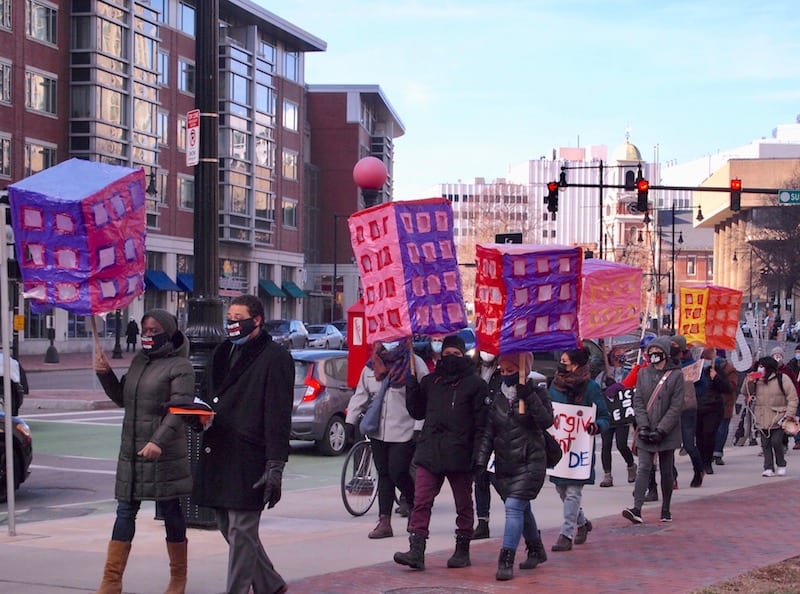Housing activists demonstrate for eviction protections
Many say federal, state aid insufficient

Despite city- and state-funded anti-eviction efforts, renters and homeowners in Massachusetts are still facing evictions and foreclosures during the COVID-19 emergency. Activists are demanding legislators at the state and federal level extend all eviction moratoriums and act now to protect families from displacement.
City Life/Vida Urbana organizers met at the Edward W. Brooke Courthouse Jan. 13 at 10 a.m. for a socially-distanced rally outside in the cold. Joined by members of churches around Boston, organizers from Homes for All and Right to the City Boston and tenants who have previously faced eviction, they spoke on the need for more protections.
“Seeing so many of my neighbors, families, friends who have to go through this process of eviction, of rent hikes, and seeing them in pain, seeing them traumatized, it’s enough. I’m seeing culture disappear. I’m seeing people who look like me and darker disappear,” said Gabriela Cartagena, an organizer with City Life/Vida Urbana.
The group demands a stronger Centers for Disease Control and Prevention moratorium, that it be extended until the federal state of emergency is lifted, and that it mirror some of the elements of the Massachusetts eviction moratorium that ended in October. The state’s moratorium was automatic, so individuals didn’t have to fill out a form to prove eligibility. It also halted the eviction process entirely, preventing cases from making it into the court system.
City Life/Vida Urbana also added a demand to ban utility shutoffs when tenants are behind on payments.
The rally was part of a nationwide call for more eviction protections from the federal government. The Boston group marched to the John F. Kennedy Federal Building, while other housing groups in California, Pennsylvania and nearly 20 other states gathered at their own federal buildings and courthouses.
Organizers claim that some landlords are not waiting for legislation to pass, nor are they accepting money through aid like the Residential Assistance for Families in Transition.
Organizer Alex Ponte-Capellan recounted the story of a landlord who rejected RAFT’s intervention.
“There’s a tenant who hasn’t paid for many months, applied to RAFT and is waiting for months until they got a response back, and RAFT is telling them, ‘We’re able to pay back up to $10,000 of what you owe.’ And some landlords are saying no to the money so that they can evict people during a pandemic. We cannot allow that to happen,” Ponte-Capellan said during the rally.
The governor’s eviction diversion initiative promised $171 million in total aid, including more money for RAFT and rapid rehousing programs. But it received backlash for further expanding the eviction process by adding more judges to process evictions and more money toward legal representation and mediation between landlords and tenants.
Starting in June of 2020, groups rallied month after month in support of the Housing Stability Act, which provided some protection and funding so renters and landlords or homeowners could stay afloat during the pandemic. To the organizers’ disappointment, the act was not signed into law.
“There’s no law right now in the state of Massachusetts that actually prevents evictions and foreclosures. You need legislation that does something like the Housing Stability Act, which will be refiled this year,” Cartagena said.







